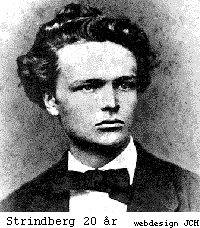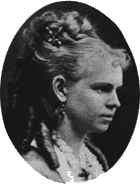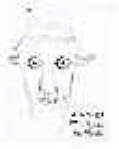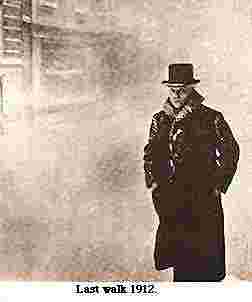|
| |
|
August Strindberg: Biography
"this long and boring walk trough the shadow land of memory"
|
August
Strindberg was born in Stockholm in 1849. Strindberg was the third child
of the shipping merchant Carl Oscar Strindberg and his former domestic
servant Ulrika Eleonora Norling. Before he became a writer he studied at
Uppsala university and worked as a librarian and journalist.
He was a very productive author. He wrote novels, plays, poetry and over
7,000 letters! The collected works consists of 55 volumes. August
Strindberg was also a very good painter. But he failed to make gold in
spite of hard efforts.
1874 Strindberg is appointed assistant librarian at the Royal Library in
Stockholm. His first major work, the play Master Olof, was
written in 1877, but was not recognized until 1881. Strindberg„s
breakthrough as a writer came with the novel The Red Room (1879).
In 1886 Strindberg completes the biografical novel The Son of a
Servant , "this long and boring walk through the shadow land of
memory" as Strindberg wrote. |
 |
|
Siri von Essen

"Siri I loved the most" |
Marriages
In 1877 he marries Baroness Siri von Essen . Siri was seven months pregnant
at the time of the marriage, the child died and they later had three
children, Karin, Greta and the son Hans. 1888, living in Denmark, Strindberg
writes the play Miss Julie, which is staged 1889 with his wife Siri von
Essen in the title role. In "A Madman's Defense" Strindberg wrote about his
first marriage, torn between adoration and contempt. After twelve years they
divorce and Strindberg, not feeling appreciated in Sweden, moves to central
Europe. After a couple of years of "artist life" with people like
Edvard
Munch and
Gaughin he marries the young Austrian Frieda Uhl . After a stormy
year travelling in Europe they divorce.
|
Tears of Joy
| In 1895 the Inferno period starts. Strindberg gets interested in
occultism and alchemy. He reads the Swedish philosopher
Swedenborg.
These years are described in, or rather are the base for the novels
Inferno and Legends.
1897 he moves back to Sweden, his recovery from the Inferno crisis is
quick. After intensive work a few days in the spring of 1898 the first part
of the play To Damascus is finished.
"Burst into tears several times today, wrote the end of Act 3",
Stindberg notes in his diary. He was satisfied, the scenes and words came
together brilliantly. |
"I got her with child immediately."
| In the Occult Diary, which Strindberg kept between 1896 and 1908, he
summarizes his relation with his third wife Harriet Bosse. |
| When I married Bosse I got her
with child immediatly. But she grudged me that great honour, and out of
spite she went off with her unborn child. She alleged that I had deserted
our bedroom, but the truth was that she had begged me to move,
as pregnancy had given her a dislike for my person. She returned and the
child was born. The next thing was that she did not want to have more
children, but did want to continue "married life". This resulted in distaste
and disgust. First we separated, then we got a divorce. After that we came
together again and I became her lover, and still am. This then is the
question, in what way have I failed ? My reputation was restored, but is so
no longe, for her lies are enduring, in spite of all there is to confute
them! At 50 I was no good as a husband, but at 58 I am good enough to be a
lover! It is sublime! Sublime !!!" |
From the "Occult Diary"

Strindberg kept his
"Occult Diary" for more than ten years. The extract below is from 1908. He
has divorced Harriet Bosse and she is planning to remarry with another man.
But in Strindberg“s fantasy she still visits him, mostly at nighttime .
|
|
April 20th.
This evening she came again, like roses, loving and full of longing.
Night came; she slept on my arm, but did not desire me until towards
morning, then ...
April 21st.
The whole morning, solely as roses. Later she disappeared! In the evening
she returned, but went again. At night apathetic and calm until the
morning,when she sought me ...
April 23rd.
A heavy day, spent in idleness. Slept much. Harriet away, but towards
evening could feel her stretching for me below the chest.
!!Went to bed, grew calmer. No contact with Harriet during the night. I
sought her but did not find her until 5 o“clock, ...
April 24th.
A glorius morning. Harriet was with me all forenoon, gentle, loving, like
flowers in my mouth!
Is she literally two persons? And do I possess one? The better one?
That would seem to be the case, for when we meet or write we hate
each other. Is this possible? |
Death
|
Finally
Strindberg released himself from Bosse, quit the Occult Diary and moved
to a new apartment. Now followed some very productive years with
highlights such as the plays Easter and The Dance of Death.
Strindberg died in May, 1912. His modest grave with just a wooden
cross bears the Latin inscription:
O Crux Ave Spes Unica!
(O Cross, Be Greeted, Our Only Hope)
|
 |
|
From: http://www.extrapris.com/
|
